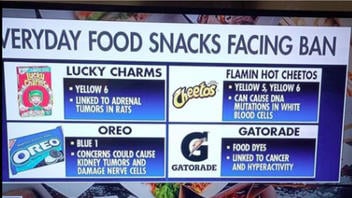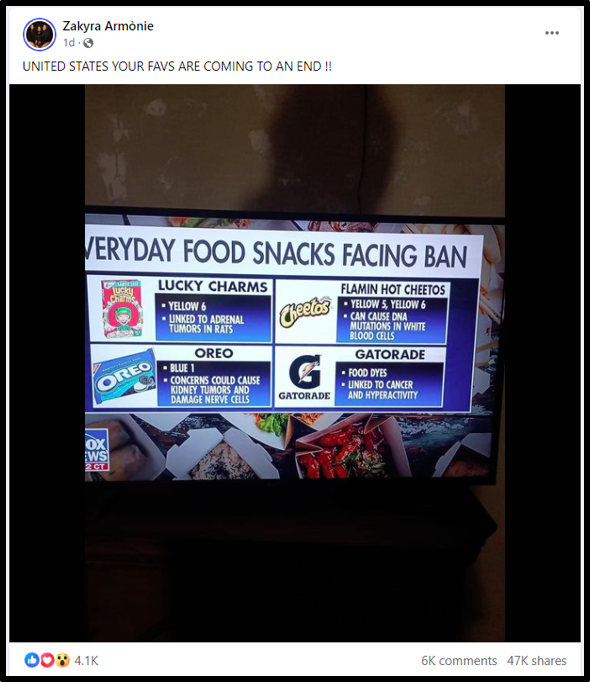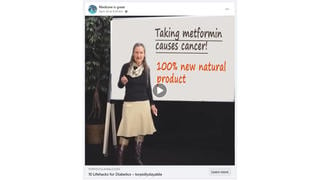STORY UPDATED: check for updates below.

Are foods like Lucky Charms, Flamin' Hot Cheetos, Oreos and Gatorade facing a nationwide ban in the United States? No, that's not true: Several states, including California, have either passed or are considering legislation to ban certain food additives, but no particular foods would be outlawed. Manufacturers can reformulate to remove the additives -- brominated vegetable oil, potassium bromate, propylparaben or red dye 3 -- from their products. There is no national ban on these ingredients.
The claim appeared in a post (archived here) on Facebook by Zakyra Armònie on April 21, 2024, under the title "EVERYDAY FOOD SNACKS FACING BAN." The post's caption said:
UNITED STATES YOUR FAVS ARE COMING TO AN END !!
This is what the post looked like on Facebook at the time of writing:
(Source: Facebook screenshot taken on Tue Apr 23 16:26:05 2024 UTC)
The social media post shows a partial Fox News logo in the bottom left-hand corner. Lead Stories found reporting by Fox Business with a story titled "Certain snacks, drinks could be banned in some states due to cancer-causing ingredients" (archived here) -- from April 2024.
The California Food Safety Act
Several states -- Illinois, Missouri, New Jersey, New York and Pennsylvania -- are considering following California's lead in banning some food additives. The legislation does not name specific food brands or products.
On October 7, 2023, Gov. Gavin Newsom signed the California Food Safety Act (CFSA) into law. The law will prohibit the production, selling or distribution of foods that contain four "possibly toxic chemical additives" in California.
Response to claim: California Department of Public Health
In an April 24, 2024, email to Lead Stories, the California Department of Public Health's Office of Communications provided the state agency's response to the claim in the social media post, saying:
The California Food Safety Act takes effect January 1, 2027, giving manufacturers time to change their processes according to their business needs. The prohibition is for the following substances in a food product for human consumption.
(1) Brominated vegetable oil (CAS no. 8016-94-2).
(2) Potassium bromate (CAS no. 7758-01-2).
(3) Propylparaben (CAS no. 94-13-3).
(4) Red dye 3 (CAS no. 16423-68-0).
The four additives are not subject to a nationwide ban.
Read more
Other Lead Stories fact checks of claims involving food additives can be found here.
Updates:
-
2024-04-25T00:33:14Z 2024-04-25T00:33:14Z Adds context from the California Department of Public Health.
















